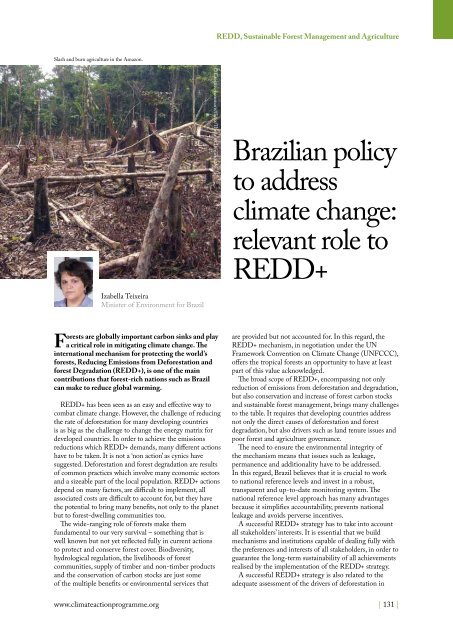Climate Action 2010-2011
Create successful ePaper yourself
Turn your PDF publications into a flip-book with our unique Google optimized e-Paper software.
Redd, Sustainable Forest Management and Agriculture<br />
Slash and burn agriculture in the Amazon.<br />
Izabella Teixeira<br />
Minister of Environment for Brazil<br />
© Creative commons/flickr/Threa to Democracy<br />
Brazilian policy<br />
to address<br />
climate change:<br />
relevant role to<br />
REDD+<br />
Forests are globally important carbon sinks and play<br />
a critical role in mitigating climate change. The<br />
international mechanism for protecting the world’s<br />
forests, Reducing emissions from deforestation and<br />
forest degradation (Redd+), is one of the main<br />
contributions that forest-rich nations such as Brazil<br />
can make to reduce global warming.<br />
REDD+ has been seen as an easy and effective way to<br />
combat climate change. However, the challenge of reducing<br />
the rate of deforestation for many developing countries<br />
is as big as the challenge to change the energy matrix for<br />
developed countries. In order to achieve the emissions<br />
reductions which REDD+ demands, many different actions<br />
have to be taken. It is not a ‘non action’ as cynics have<br />
suggested. Deforestation and forest degradation are results<br />
of common practices which involve many economic sectors<br />
and a sizeable part of the local population. REDD+ actions<br />
depend on many factors, are difficult to implement, all<br />
associated costs are difficult to account for, but they have<br />
the potential to bring many benefits, not only to the planet<br />
but to forest-dwelling communities too.<br />
The wide-ranging role of forests make them<br />
fundamental to our very survival – something that is<br />
well known but not yet reflected fully in current actions<br />
to protect and conserve forest cover. Biodiversity,<br />
hydrological regulation, the livelihoods of forest<br />
communities, supply of timber and non-timber products<br />
and the conservation of carbon stocks are just some<br />
of the multiple benefits or environmental services that<br />
are provided but not accounted for. In this regard, the<br />
REDD+ mechanism, in negotiation under the UN<br />
Framework Convention on <strong>Climate</strong> Change (UNFCCC),<br />
offers the tropical forests an opportunity to have at least<br />
part of this value acknowledged.<br />
The broad scope of REDD+, encompassing not only<br />
reduction of emissions from deforestation and degradation,<br />
but also conservation and increase of forest carbon stocks<br />
and sustainable forest management, brings many challenges<br />
to the table. It requires that developing countries address<br />
not only the direct causes of deforestation and forest<br />
degradation, but also drivers such as land tenure issues and<br />
poor forest and agriculture governance.<br />
The need to ensure the environmental integrity of<br />
the mechanism means that issues such as leakage,<br />
permanence and additionality have to be addressed.<br />
In this regard, Brazil believes that it is crucial to work<br />
to national reference levels and invest in a robust,<br />
transparent and up-to-date monitoring system. The<br />
national reference level approach has many advantages<br />
because it simplifies accountability, prevents national<br />
leakage and avoids perverse incentives.<br />
A successful REDD+ strategy has to take into account<br />
all stakeholders’ interests. It is essential that we build<br />
mechanisms and institutions capable of dealing fully with<br />
the preferences and interests of all stakeholders, in order to<br />
guarantee the long-term sustainability of all achievements<br />
realised by the implementation of the REDD+ strategy.<br />
A successful REDD+ strategy is also related to the<br />
adequate assessment of the drivers of deforestation in<br />
www.climateactionprogramme.org | 131 |












